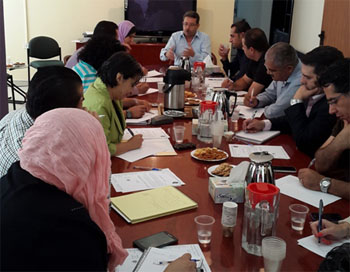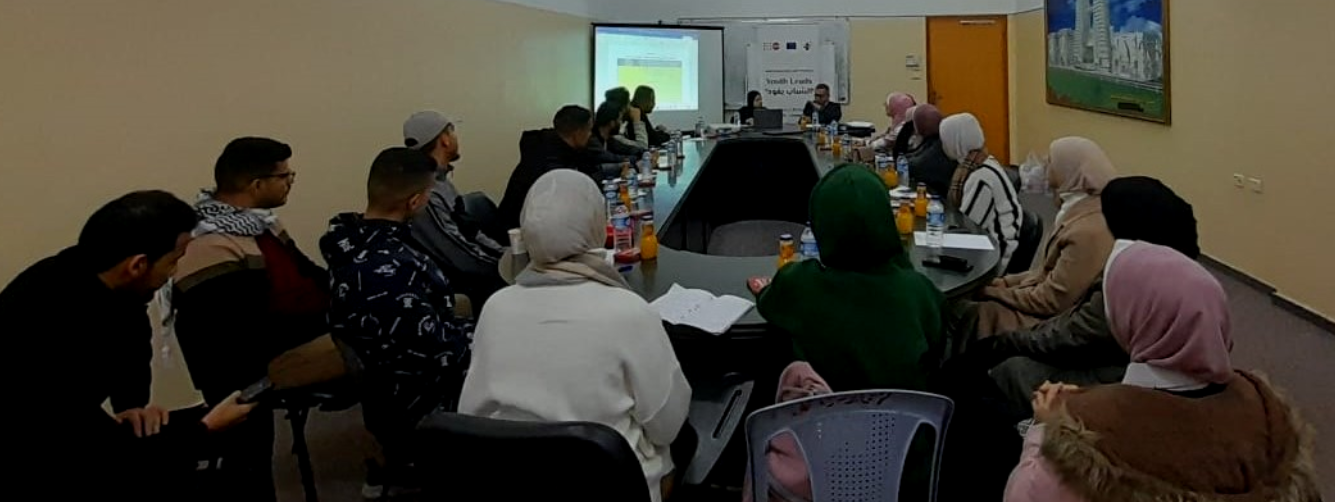
Ramallah – Participants in a public hearing session held by MIFTAH to review the budget statement announced by the Ministry of Finance for 2014, recommended that the ministry should modify the budget to become more responsive to gender needs. They also recommended that every ministry should officially have a gender team or at least activate the ministries’ gender units, on condition that the coordinator of this team or unit head is an active member of the budget committee.
Integrating gender in the strategic plan
In their recommendations, the participants also called for adopting and distributing clear directives regarding the integration of gender in the annual and strategic plan and then in the policies and programs of each ministry. They called for developing a database at each ministry categorized on a gender basis; at the beginning of April of each month, the gender team or unit will have the responsibility of formulating a document that includes the developments, foundations and priorities of the ministry on a gender basis, with this document ratified by the minister before being sent to the budget committee at the end of June of each year. Once the budgetary committee receives the budget notification from the finance ministry, it will distribute the ceiling for expenditures to programs and projects accordingly in addition to discussing the gender-integrated draft budget in a senior administration meeting at the ministry, until the beginning of November of each year.
Gradual transformation to a gender-responsive budget
The participants agreed on the principle of a gradual transformation to a gender-responsive budget whereby one or more ministries will be chosen according to their importance (education or health for example) to form a pilot for preparing a gender-responsive budget. One program would be created in each of the two ministers and their budgets prepared on a gender basis. Thus, the move from one ministry to another or from one program to another until the transformation to gender-responsive budgets is completed.
Dr. Lily Feidy: the goal is to promote social dialogue and impact public policies
MIFTAH CEO Dr. Lily Feidy opened the session, which she said was part of MIFTAH‘s program to promote social dialogue in order to impact public policies in addition to MIFTAH’s interest in institutionalizing a gender-based budget. She explained that in 2005, MIFTAH, in cooperation with the Ministry of Finance, began work on this and were able to score an accomplishment in 2009 when the Salam Fayyad government institutionalized gender in the general budget.
Dr. Nasr Abdel Kareem: The Palestinian budget is still conventional and neutral towards development issues
Economic expert Dr. Nasr Abdel Kareem showcased the preliminary results on the Finance Ministry’s 2014 general budget. He explained that gender-sensitive budgets do not necessarily mean separate budgets for males and females or equal distribution of financial resources. Still, Abdel Kareem said the government has not abided by any of the dates stipulated in the law regulating the budget for the most part of the past 10 years. Rather, the budget has remained an article-based budget in spite of efforts to transform it into one of programs and performance or a gender-responsive budget. Furthermore, Abdel Kareem says, the executive authority has monopolized most of if not all the jurisdictions regarding administration of the budget in light of the defunct PLC, the weakness of political forces and the disconnected efforts of civil society.
Dr. Abdel Kareem added that public expenditures not only increased over the years, they remained systematically unresponsive to gender needs in general, with the exception of a few ministries that allocated financial resources that were semi-gender responsive.
Director General of the Ministry of Finance budget department Fareed Ghannam maintained that the ministry was continuing to work with local and international institutions on the subject of gender-responsive budgets even if they had not reached the desired level.
Ghannam indicated that his ministry would include an article on a gender-responsive budget in the budget announcement, saying the Ministry of Finance had updated the group for planning and budgetary administration and teams for managing the ministry’s programs with the goal of linking between the political and executive levels. “The problem we have now is that the budget of each ministry is prepared by its financial director,” Ghannam said, adding that the Ministry of Finance was seeking a decision by the cabinet on overcoming such obstacles.
Still, Ghannam admits that his ministry has failed until now to convey and cement the idea of a gender-responsive budget in other ministries. He maintained that in order to correctly convey the concept, the idea of a gender-responsive budget should not only be linked to women but to other marginalized sectors.
A discussion on the session then followed, including comments such as the fact that the budget is not dealt with as a draft law and therefore, does not give not enough time to make comments on it. Furthermore, commentators said the finance ministry announces certain approaches but never implements them on the ground.
Some participants suggested that formulating and preparing the budget should precede the planning stage, stressing on the importance of these stages, which precede the budget’s implementation and auditing. They also pointed out the importance of institutions in this regard, commending the role of MIFTAH, especially in terms of raising awareness on the subject.
Other participants pointed to the problem of multiple titles related to gender, calling for a change in the ministries’ structure in order to create more of a balance. This, they said, starts with gender planning and the necessary political will to realize the importance of this matter. They also pointed out that there was a problem in the preparation phase of the budget, which they said was conducted quickly and without including civil society organizations.
Others said the problem is two-pronged: the first is political and related to the responsibility of the defunct PLC, while the second was related to civil society institutions, which also bear the responsibility in creating a framework for lobbying.







